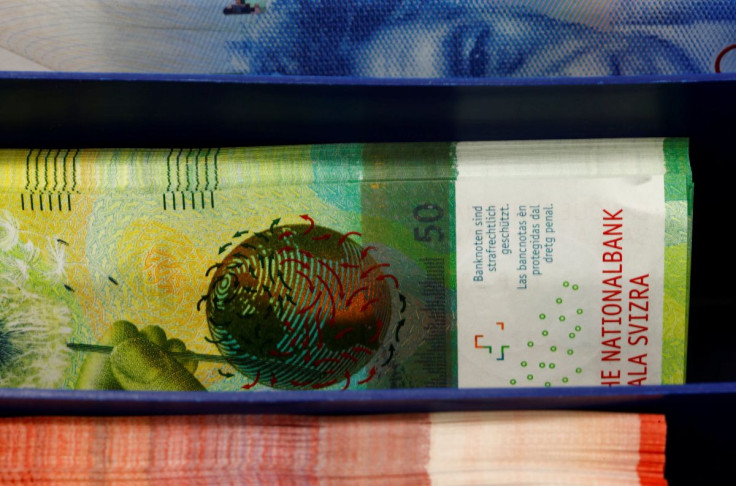Swiss Franc Set For Best Day Vs Euro In Seven Years After SNB Hike

The Swiss franc soared on Thursday after the Swiss National Bank delivered a surprise interest rate hike, triggering its biggest daily jump against the euro since the central bank ditched its currency peg in 2015.
The SNB joined other central banks in tightening monetary policy to fight surging inflation in its first rate hike in 15 years, increasing its policy rate to -0.25% from the -0.75% level it has deployed since 2015.
The Swiss franc surged to a two-month high against the euro and was set for the best day against the single currency since January 2015. It was 1.8% higher against the euro at 1.0200 as of 1028 GMT.
Against the U.S. dollar, the franc rose 1.4% to 0.9807, on track for its best single day versus the greenback in almost one month.
"The SNB move comes as a big shock," said Jane Foley, head of FX strategy, at Rabobank in London.
"Talk had been building that the SNB could start to move away from their deeply negative position on rates under the cover of the more hawkish ECB, but today's 50 bps move is still a big surprise."
Most analysts had expected the SNB to hold rates on Thursday and flag a hike for September, although a couple of banks had predicted a 25 bps move.
The move followed a 75 basis point (bps) rate hike by the U.S. Federal Reserve on Wednesday, while the European Central Bank signalled last week it would raise its rates in July and the Bank of England is expected to raise rates later today.
SNB and the Bank of Japan, which meets on Friday, were the only two major developed world central banks yet to raise interest rates in a tightening cycle that started late last year.
BOE NEXT
Sterling was volatile ahead of Thursday's BoE meeting amid worsening global risk sentiment and expectations that the BoE could deliver a heftier increase after the SNB hike.
The BoE is expected to raise borrowing costs for the fifth time since December despite worries about a sharp slowdown in the British economy.
Sterling slid 1% to $1.2059 in early London trading, not far from a two-year low touched this week. It was last down 0.15% at $1.2158 ahead of the BoE meeting, which is expected to bring at least a 25 bp hike, with swaps pricing implying about an 80% chance of a 50 bps hike.
"If we were to see a 50bps hike, not our central case view, we would look to sell into any knee-jerk rally as the macro story remains troublesome," said Jeremy Stretch, head of G10 FX strategy at CIBC.
Traders were also closely watching several ECB speakers after the central bank promised to control borrowing costs for the euro zone's periphery countries after an emergency meeting on Wednesday.
Versus the dollar, the euro fell 0.35% to $1.0409, not far from a one-month low touched on Wednesday.
Amid worsening market risk sentiment, the safe-haven U.S. dollar rose against a basket of peers, nearing a 20-year high touched before the Fed upped borrowing costs on Wednesday by the most since 1994.
The dollar index rose 0.22% to 105.06.
© Copyright Thomson Reuters 2024. All rights reserved.







